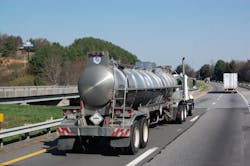Recovering consumer confidence and increased spending will support growth in freight volumes, boosting trucking industry demand. However, the industry will face rising competition from other modes of transportation, such as rail, air and ocean, according to an IBISWorld report titled “Local Freight Trucking industry.”
The trucking industry has not fared well in the past five years; slow manufacturing production and retail spending reduced demand and hurt revenue for the industry during the economic downturn, according to IBISWorld industry analyst Lauren Setar. Declining demand caused greater price competition among carriers, which limited profit margins. Additionally, soaring diesel costs dramatically reduced profitability in 2008, though many industry operators implemented fuel surcharges, Setar said.
“These surcharges increase revenue but are not sustainable in the long term as customers seek alternatives,” Setar says.
IBISWorld said trucking profit margins for 2012 are expected to increase to 6.4% of revenue due to rising demand; however, profit will remain below prerecession levels due to continued price competition and increasing fuel costs.
“The trucking industry performed miserably in 2009 when revenue plummeted 20.5%,” added Setar. “Weak operating conditions pushed firms into record losses in 2008 and 2009, forcing some operators out of the industry completely.”
Furthermore, a drastic reduction in diesel prices in 2009 caused revenue from fuel surcharges, which are tacked on when diesel prices are high, to decrease during the year, Setar said. Consequently, revenue is expected to fall at an average annual rate of 3.3% to $32.4 billion during the five years to 2012. This year, IBISWorld expects that recovering demand and increased shipping volumes will cause industry revenue to lift by 2%.
Along with consolidating of trucking companies through acquisitions over the past decade, trucking employment has also fallen over the period due to decreased demand. However, conditions are projected to improve slightly over the next five years, the report stated.
As the economy recovers, the industry is expected to grow along with disposable income and, therefore, demand generated from manufacturing and retail spending. Additionally, diesel prices will cause growth in the five years to 2017 as companies heighten fuel surcharges to offset costs, though profit will eventually diminish, Setar said.
For more information, visit IBISWorld’s Local Freight Trucking in the US industry.
